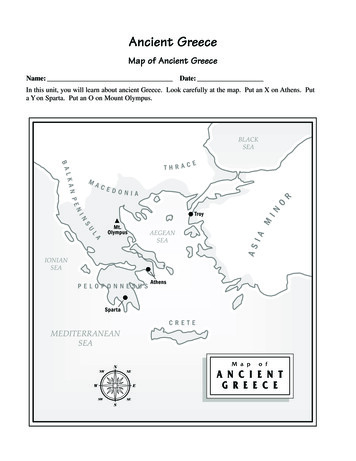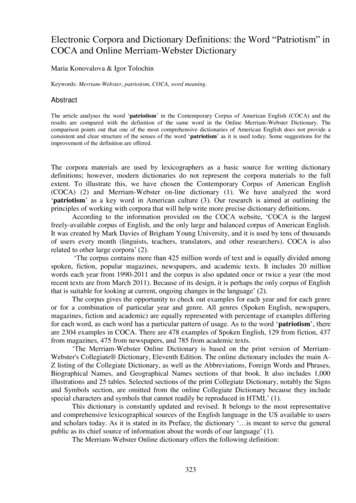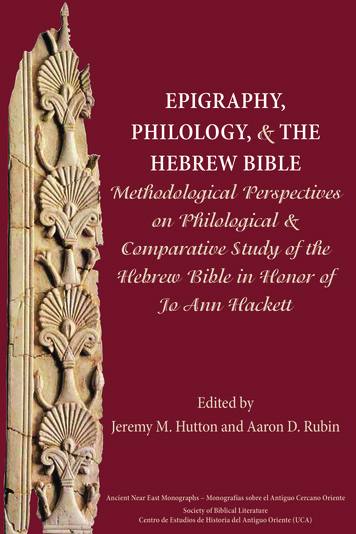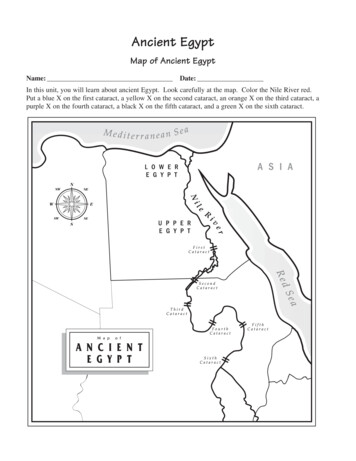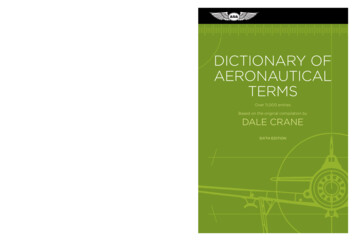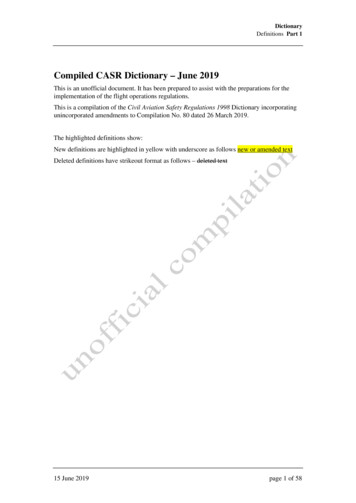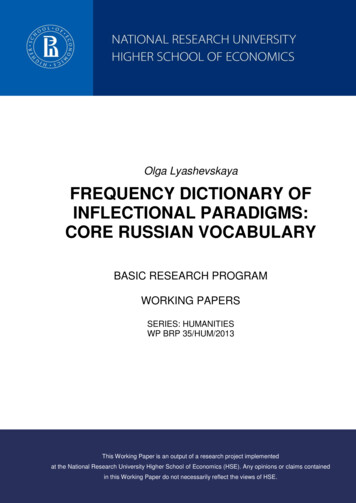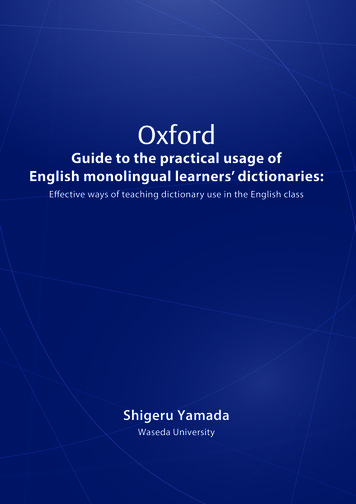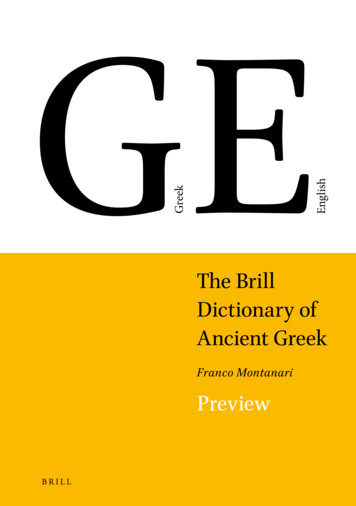
Transcription
GreekEnglishGEThe BrillDictionary ofAncient GreekFranco MontanariPreview
The Brill Dictionary of Ancient GreekFranco Montanari, GenoaEnglish Edition edited by Madeleine Goh and Chad Schroeder,under the auspices of the Center for Hellenic StudiesAdvisory Editors: Gregory Nagy, Harvard, and Leonard Muellner, Brandeis June 2015 ISBN 978 90 04 19318 5 Hardback (approx. 2400pp.) List price EUR 99 / US 125 / 85The Brill Dictionary of Ancient Greek is the English translation of Franco Montanari’s Vocabolario dellaLingua Greca, published by Loescher. With an established reputation as the most important moderndictionary for Ancient Greek, it brings together 140,000 headwords taken from the literature, papyri,inscriptions and other sources of the archaic period up to the 6th Century CE, and occasionally beyond.The Brill Dictionary of Ancient Greek is an invaluable companion for the study of Classics and AncientGreek, for beginning students and advanced scholars alike.Translated and edited under the auspices of The Center for Hellenic Studies in Washington, DC,The Brill Dictionary of Ancient Greek is based on the completely revised 3rd Italian edition publishedin 2013 by Loescher Editore, TorinoFeatures- The principal parts of some 15,000 verbs are listed directly following the entry and itsetymology. For each of these forms, the occurrence in the ancient texts has been certified.When found only once, the location is cited.- Nearly all entries include citations from the texts with careful mention of the source.- The Dictionary is especially rich in personal names re-checked against the sources for the 3rdItalian edition, and in scientific terms, which have been categorized according to discipline.- Each entry has a clear structure and typography making it easy to navigate.The Brill Dictionary of Ancient Greek will also become available as an online resource.* This booklet is a preview of The Brill Dictionary of Ancient Greek.The format and paper used for this preview are not indicative of the final, printed version of the dictionary.
The Brill Dictionaryof Ancient GreekByFranco MontanariEditors of the English EditionMadeleine Goh (β–σ) & Chad Schroeder (α, υ–ω)under the auspices of theCenter for Hellenic Studies, Washington D.C.Advisory EditorsGregory Nagy (Harvard, CHS)Leonard Muellner (Brandeis, CHS)LEIDEN BOSTON
2012082 [Montanari] 01-Guide-sample-06c [date 1312112325 : version 0] page 0Visual GuideEntryExampleTranslation (regular text)Explication and commentaryarticle, nominative feminine singular Lesbianarticle, nominative feminine singular Doricrelative pronoun, nominative feminine singularLesbianpresent indicative middle 3rd person singularof the verbs ἄω and ἀάω respectivelyadverbial form of ἀγαθοδότης as separate entryNumbers on a black background demarcate usesand senses of the word. Further distinctions ofsignificance and usage are introduced by lettersin square boxes.Sign introducing the adverbSign introducing grammatical anddialectal forms and graphic variantsNumbered homographous entries Α, α, τό (ἄλφα) indecl. alpha, first letter of theGreek alphabet: ἐγώ εἰμι τὸ ἄλφα καὶ τὸ ὦ, ὁπρῶτος καὶ ὁ ἔσχατος, ἡ ἀρχὴ καὶ τὸ τέλος I am theAlpha and the Omega, the first and the last, thebeginning and the end NT. Apoc. 22.13 num. α′ 1; α 1,000.ᾰ̔- and ᾰ̓- [IE *sm̥ -; Lat. sem-, sim-, Skt. sa-; seeἅμα] copulative prefix (α ἀθροιστικόν) expressing togetherness: ἅ-πας all; ἄ-λοχος bed companion, wife τὸ ἄλφα σημαίνει πολλαχοῦ τὸ ὁμοῦalpha often signifies ‘together’ Plat. Crat. 405c Grammatical tag (indecl. indeclinable)Translation (bold text)Comment (italic text)Source (New Testament, Revelation 22.13)Etymology (IE Indo-European;the asterisk signals a reconstructed form;Lat. Latin, Skt. Sanskrit.) }}}}}}}ἄαται Hes. Sc. 101, pres. ind. mid. 3. sg. of ἄω.}}ἀᾶται pres. ind. mid. 3. sg. of ἀάω.} Reference entriesἀγαθοδότης -ου [ἀγαθός, δίδωμι] giver of good }Diotog. (Stob. 4.7.62) etc. adv. ἀγαθοδότως }}giving good Eustr. in EN. 387.11 generously }}}Dion21. CH. 120B}}[ ]}}ἀγαθοδότως adv., see ἀγαθοδότης. ᾱ̓ art. nom. fem. sg. Lesb., see ὁ, ἡ, τό.ᾱ̔ art. nom. fem. sg. Dor., see ὁ, ἡ, τό.ᾱ̓́ rel. nom. fem. sg. Lesb., see ὅς, ἥ, ὅ.ἀγαθοεργία and ἀγαθουργία -ας, ἡ [ἀγαθοεργός]good deed, benefit Hdt. 3.154.1 Iul. 4.135d etc.Ion. -ίη. ᾰ̓γᾰθός -ή -όν ➊ of pers. good: a well-born, noble Il. 21.109 etc. with ἀφνειός Il. 13.664 withεὐγενής Soph. fr. 724.1; καλοὶ καὶ ἀγαθοὶ ἄνδρεςwell-born men, aristocrats Plut. Demosth. 4.1cf. καλοκἀγαθός b valiant, skilful, capable, excellent: ἀ. βασιλεύς good king Il. 3.179; ἀ. θεράπων excellent servant Il. 16.165 with acc. ofrelation: βοὴν ἀ. good at the battle-cry, of powerful voice Il. 2.408, al.; ἀ. γνώμην skilled at giving934 adv. ἀγαθῶς well Hp. Off. 4.7 Aristot. Rh.1388b 6 etc. interject. good!, very well! VT. Reg.1.20.7 crasis τὸ ἀ. τἀγαθόν, τοῦ ἀ. τἀγαθοῦ,οἱ ἀ. ἁγαθοί, τὰ ἀ. τἀγαθά prodelision ὦ ἀ. ὦ’ γαθέ (instead of crasis ὦγαθέ) Lac. ἀγασόςAristoph. Lys. 1301 Lesb. ἄγαθος Cypr. ἀζαθός later compar. ἀγαθώτερος (common. suppl. ἀμείνων and ἀμεινότερος, ἀρείων, βελτίων and βέλτερος, κρείσσων, λῴων and λωίτερος, φέρτερος) later superl. ἀγαθώτατος (common. suppl. ἄριστος, βέλτιστος and βέλτατος, κράτιστος, λῷστος,φέριστος e φέρτατος). 1. ἀκτή -ῆς, ἡ wheat, as flour or food Il. 11.631etc.; Δημήτερος ἀ. fruit of Demeter Il. 13.332, al.[ ]2. ἀκτή -ῆς, ἡ [ἀκ-] a shore (of the sea), highcliffs, land's end, promontory Il. 24.97, al. Variant form of the entry Source (Iliad 21.109; etc. et cetera, whenthe word is also found in other authors) Source (Iliad 2.408; al. alibi (elsewhere),when the word is found in other passagesof the same author)Indicates transformation (in this caseτὸ ἀγαθόν becomes τἀγαθόν by crasis)
2012082 [Montanari] 01-Guide-sample-06c [date 1312112325 : version 0] page 0Within the principal parts section, the doublevertical bars ( ) separate the tenses; the singlebars ( ) separate the moods within each tense.Subdivisions of the entry. The numbers on ablack background followed by act., mid., andpass. in italics indicate the respectivesubdivisions of the entry according to theverb’s three voices.Subdivisions of the entry. The bold lettersin square boxes introduce different usesand meanings of the verb.Further subdivisions of the entries areintroduced by the double ( ) and the single( ) bar. αἴρω impf. ᾖρον, mid. pass. ᾐρόμην fut. ἀρῶ, mid.ἀροῦμαι aor. ἦρα, mid. ἠράμην inf. ἆραι, mid.ἄρασθαι ptc. ἄρας, mid. ἀράμενος pf. ἦρκα(gener. in compd.), mid. ἦρμαι (mid. signf.) ppf.3. pl. (ἀπ)ήρκεσαν, mid. pass. 3. sg. ἦρτο aor.pass. ἤρθην fut. pass. ἀρθήσομαι.➊ active a to raise, lift, with acc. intrans. act.to rise b to take, in order to carry or transport pick up, gather, of grain of water todraw c to take upon oneself, assume tonurture, educate of garments to put on to nurture, educate d milit. to decamp, depart of ships to raise anchor, embark, abs. to enroll, enlist e to take away, remove, eliminate , to destroy, kill, annul, suspend philos. to contest, deny f fig. to arouse, exalt, excite, aggrandize, exaggerate to exalt,praise ➋ middle a to raise, lift, lift up, exalt b to take for oneself, choose, with acc. to obtain, conquer c to take on oneself, taketo oneself d to remove, eliminate to destroy, kill e fig. to rouse up, undertake ➌ passive a to be raised up, rise aor. pass. tobe raised, rise; ppf. to be suspended, hang med. to swell b milit. to embark to leavec to be taken away, removed, eliminated d tobe exalted, be aggrandized, increase e to bearoused, undertaken➊ active a to raise, lift with acc. νεκρὸνἀείραντες lifting the corpse Il. 17.718, al. Od.1.141, al. etc.; ἆρ’ὀρθὸν αἴρεις τὸ σὸν κάρα; won’tyou lift up your head? Aeschl. Ch. 496, al. etc. Principal parts: recorded next to the lemma,contains actually attested forms. In forms witha single attestation, the source for the form issometimes recorded, together with thehistorical and dialectal context when appropriate.Recapitulatory overview. Especially complexentries (like prepositions, some verbs, pronouns,and conjunctions) begin with a recapitulatoryoverview that aids orientation in the entry’scomponent parts.Sign introducing indications of governmentof case, and other syntactic constructionson VT. Reg. 1.2.28, al. to nurture, educateHerond. 9.13 d milit. to decamp, depart, withthe troops abs. Thuc. 2.23.1; ἄρας τῷ στρατῷHld. 9.22.5 ➋ middle a to raise, lift: ἀείρεσθαιτὰ ἱστία to hoist the sails Hdt. 8.56, al.; αἰρόμενοςτοὺς ἱστούς having set up the masts (of theHdt. 4.150.3 ➌ passive a to be raised up, riseIl. 8.74 Od. 12.432 Thuc. 2.94.1 etc.; ἐς αἰθέρα ἀέρθη she rose into the ether Od. 19.540 epic pres. Ion. poet. ἀείρω (*ἀ-Ϝερ-), Lesb.ἀέρρω, epic poet. mid. ἀείρομαι imper. Lesb.ἀέρρετε Sapph. 111.3 (v.l. -ατε aor.) epic impf.ἄειρον epic Ion. -ήειρον epic aor. ἄειρα, epic Ion.-ήειρα, mid. 3. sg. Dor. ἄρατο subj. act. 3. sg. poet.ἀέρσῃ opt. 2. sg. ἄραις imper. mid. 2. sg. epicIon. ἀείραο epic inf. mid. Ion. ἀείρασθαι epic ptc.Ion. ἀείρας, mid. ἀειράμενος later epic pf. mid.ἤερμαι (pass.) epic ppf. mid. pass. 3. sg. ἄωρτο( ἤορτο) epic aor. pass. ἀέρθην epic Ion. ἠέρθην,3. pl. epic ἄερθεν always ᾱρ-; for ᾰρ- see ἄρνυμαι. At the end of the entry, the sign introducesdialectal, poetic, or otherwise notable variantforms.
TranslatorsRachel Barritt-CostaBarett-CostaRachelMichael ChappellMichael ChaseEla HarrisonPatrick Paul HoganJared HudsonSergio KnipePeter MazurSerena PerroneChad SchroederChris WelserProofreadersMike ChappellEla HarrisonPatrick Paul Hogan
Α, α, τό (ἄλφα) indecl. alpha, first letter of theGreek alphabet: ἐγώ εἰμι τὸ ἄλφα καὶ τὸ ὦ, ὁπρῶτος καὶ ὁ ἔσχατος, ἡ ἀρχὴ καὶ τὸ τέλος I am theAlpha and the Omega, the first and the last, thebeginning and the end NT. Apoc. 22.13 num. α′ 1; α 1,000.1. ᾰ̓- (ἀν- bef. a vowel) [IE *n̥ -; Lat. in-, Skt.a(n)-, Goth. un-] privative prefix (α στερητικόν)with negative force, indicating lack or absence:ἄ-φιλος without friends, ἀν-ώνυμος namelessin poetry often ᾱ when followed by two shortsyllables2. ᾰ̓- [see ἁ-] intensive prefix (α ἐπιτατικόν) withstrengthening force, related to the copulative ἀ(see) but distinguished by the gramm.: ἀ-τενήςstretched tight, very intent3. ᾰ̓- prothetic vowel, bef. a consonant or consonant cluster: ἀλείφω, ἀστήρ (or followed by avowel after the disappearance of Ϝ: ἀ-Ϝείδω ἀείδω).ᾰ̔- and ᾰ̓- [IE *sm̥ -; Lat. sem-, sim-, Skt. sa-; seeἅμα] copulative prefix (α ἀθροιστικόν) expressing togetherness: ἅ-πας all; ἄ-λοχος bed companion, wife τὸ ἄλφα σημαίνει πολλαχοῦ τὸ ὁμοῦalpha often signifies ‘together’ Plat. Crat. 405cᾱ̓ art. nom. fem. sg. Lesb., see ὁ, ἡ, τό.ᾱ̔ art. nom. fem. sg. Dor., see ὁ, ἡ, τό.ᾱ̓́ rel. nom. fem. sg. Lesb., see ὅς, ἥ, ὅ.1. ᾰ̔́ rel. nom. acc. neut. pl., see ὅς, ἥ, ὅ.2. ᾱ̔́ rel. nom. fem. sg. Dor., see ὅς, ἥ, ὅ.ᾇ rel. dat. fem. sg. Dor., see ὅς, ἥ, ὅ.ἆ and redupl. ἆ ἆ interjec. ah! and ah! ah!,expressing pity, contempt, warning, amazementArchil. 109.1 (doub.) Aeschl. Ag. 1087, al.Soph. Ph. 1300, al. Eur. Hel. 445, al. Aristoph.Ran. 759, al. etc.: ἆ, μὴ κόλαζε, πρέσβυ, τόνδεAh! Do not rebuke him, old man Soph. OT.1147; often with adj. Il. 11.441, 17.443; ἆ δειλοίah! miserable ones Od. 20.351 etc.; ἆ τάλας ah!unfortunate man Sem. 7.76; ἆ μάκαρ ah! blessedone Thgn. 1013 Bacchyl. Dith. 16.30 Hippon.117.6; also ἆ ἆ ἆ and ἆ ἆ ἆ ἆ Eur. Cycl. 157 (codd.)poet., rare in prose: Plat. HipMa. 295a.ἂ ἄ interjec. ah! ah! Com. CGFP 239.17 Eur. Rh.687 (v.l.) [Greg.] ChrPat. 637, 809, al., see ἆ σχετλιαστικὸν ἐπιφώνημα Hsch. α4; ἀπόφασιςἀρνητική Phot. Lex. α1 Sch. Plat. HipMa.295aἃ ἅ (or ἇ ἇ) ha! ha!, expressing laughter, γέλωταδηλοῖ Hsch. α2 Phot. Lex. α2; problematicattestation: conject. in Eur. Cycl. 157 (codd. ἆ ἆἆ) and Plat1. 16ἀάατος -ον [see ἄω ?] inviolable or undeceiving,of the water of the Styx Il. 14.271 (ᾰαᾱ ̄) unimpeachable, without error, thus decisiveor terrible, fatal, of a contest Od. 21.91, 22.5(ᾰαᾱ ̆) κάρτος ἀ. invincible in strength Ap. 2.77(ᾰαᾱ ̆) NB unc. signif. and etym.ἀαγής -ές [ἄγνυμι] unbreakable, solid Od. 11.575Theocr. 24.123 ᾱᾱ Ap. 3.1251 QS. 6.596.ἀαδής see ἀδής.ἀάζω [see ἄζω] onomat. to exhale, breathe, onlypres. Aristot. Pr. 964a 16, al.ἀάλιος -ον doub. signf. confused, weak, or perhaps untouched Ap9. Hsch. Phot. Lex. etc.ἀάνθα, ἡ [οὖς, ἄνθος ?] earring Alcm. 127 Aristoph2. fr. 422ᾰ̓́ᾱπτος -ον untouchable, dreadful, invincible Il. Αα 1.567, al. Hes. Op. 148, al. Opp. 5.629 v.l. ἄεπτος(trag.).Ἀαρών, ὁ Hebr. indecl. a Aaron, brother of MosesVT. Ex. 4.14, al. NT. Lu. 1.5, al. b ark Epiph.Mens. 4 (43.244C) (perhaps for Ἀρών).ᾱ̓́ᾱς (ἀᾶς ?) [see ἠώς] gen. sg. of * ἄα tomorrow orthe day after tomorrow Il. 8.470 (Zenod2. v.l.for ἠοῦς, see ἠώς) Hschἄασα, ἀασάμην, ἀάσθην aor. ind. act., mid., pass. ofἀάω.ἀασιφόρος -ον [ἀάω, φέρω] bringing harm Hschἀασιφρονία -ας, ἡ [ἀάω, φρήν] folly Ap9. Phot. Lex.α14ἀασιφροσύνη see ἀεσιφροσύνη.ἀασίφρων see ἀεσίφρων.ἀάσκω [ἀάω] to harm Hschἀασμός -οῦ, ὁ [ἀάζω] exhalation, breath Aristot.Pr. 964a 18ἀάσπετος QS. 3.673, al., see ἄσπετος.ἀάσχετος Il. 5.892 etc., see ἄσχετος.ἀᾶται pres. ind. mid. 3. sg. of ἀάω.ἄαται Hes. Sc. 101, pres. ind. mid. 3. sg. of ἄω.ᾰ̓ᾰ́τη -ης, ἡ Hes. Op. 352 (v.l.) Callim. fr. 557, seeἄτη.ᾰ̓ᾱτήρ -ῆρος, ὁ [ἀάω] dishonorer Man1. 4.561. ᾰ̓́ᾰτος, contr. ἆτος -ον [ἄω] insatiable: ἄατοςπολέμοιο insatiable in war Hes. Th. 714 ἆτοςπολέμοιο Il. 5.388 (v.l. ἄατος); μάχης ἆ. insatiablein battle Il. 22.218, al.; ἄατος ὕβρις insatiableviolence Ap. 1.459 (ᾱᾰ)2. ᾰ̓́ᾱτος QS. 1.217, see ἄητος.ἀάω ➊ active to disturb, upset (the mind),deceive, harm Il. 8.237 Od. 11.61, al. QS. 13.429;ἄασάν μ’ ἕταροι my companions ruined me Od.10.68 ➋ middle a active Il. 19.91 b gener.intrans. (aor.) to be bewildered, blind, in one'smind Il. 9.116, al. Ap. 1.1333, al. QS. 5.422, al.Nonn. D. 5.478, al. ➌ passive (aor.) to bedisturbed, upset, bewildered Il. 19.136 Od.4.503, al. Hom. 2.258 Hes. Op. 283 Ap. 4.412,al.; φρεσὶν ᾗσιν ἀασθείς bewildered in his mindOd. 21.301 pr. only mid. 3. sg. ἀᾶται (contr.) aor. ἄασα (ᾰᾰ Il. 8.237; ᾱᾱ Od. 10.68; ᾰᾱ Matr.Conv. 29, conject.) contr. ἆσα, mid. ἀασάμηνcontr. ἀσάμην, 3. sg. ᾱἀ σ́̄ (σ)ατο Il. 9.537 contr.inf. act. ἆσαι Aeschl. fr. 417 pt. ἄσας Soph.fr. 628 aor. pass. ᾰᾱ̓ σ́ θην esp. epic, rare intrag.ἄβα Lesb., see ἥβη.1. Ἄβα -ης, ἡ Aba, city: in Phokis (sanctuary ofApollo) Hdt. 1.46.2, al. Aristot. fr. 601 etc. inArabia Diod. 32.10.2 in Karia Steph1. in LykiaSch. Soph. OT. 899 also pl. Ἄβαι -ῶν, αἱ.2. Ἄβα -ης, ἡ Aba, female name Strab. 14.5.10 nymph Harp1. (s.v. Ἐργίσκη) etc.Ἀβα(δ)δών, ὁ Hebr. indecl. Abaddon, name of afallen angel NT. Apoc. 9.11ἀβάδιστος -ον [βαδίζω] untrodden, unploughed,the sea Sch. Opp. 2.526ἀβαθής -ές [βάθος] not deep, without depth Gal.11.127 (wounds) Arr. Tact. 5.6 Sext. P. 3.43 Simp.in Phys. 572.25ἄβαθρος -ον [βάθρον] without foundation, immense GeorgP. Hex. 131 Cyr2. (C)Ἄβαι see Ἄβα.Ἀβαῖος -ου, ὁ [Ἄβα 1] Abaian, inhabit. of AbaPaus. 10.3.2, al. Steph1. (s.v. Ἄβαι) also ἈβεύςSteph1. l.c. ἀβάκ, ὁ Hebr. indecl. byssus, fine linen cloth VT.Chr. 1.4.21Ἀβάκαινα -ης, ἡ Abakaina, see Ἀβακαινῖνος.Ἀβακαινῖνος -η -ον [Ἀβάκαινον] inhabit. of Abakainon Diod. 14.78.5, 19.110.4 Steph1.Ἀβάκαινον -ου, τό Abakainon, city in Sicily Diod.14.90.3 Ptol4. Geog. 3.4.12 Steph1.; in MediaPtol4. Geog. 6.12.17 also fem. Ἀβάκαινα.ἀβάκειον see ἀβάκιον.ἀβακέω, contr. [ἀβακής] to stay silent, out ofamazement or surprise: οἱ δ’ ἀβάκησαν πάντεςthey said nothing, kept quiet Od. 4.249 cf. Ap9.2.16 Hsch. α54 Phot. Lex. α21-22 NB doub. signf.(perhaps to fail to recognize: Eustath. 1494.60,al.) aor. inf. ἀβακῆσαι.ἀβακέως adv., see ἀβακής.ἀβακήμων -ονος [ἀβακέω] speechless, silent orfoolish AelD. α3 Hsch. Phot. Lex., see ἀβακής.ἀβᾰκής -ές [βάζω ?] prob. speechless, silent,hence calm, tranquil: ἀβάκην τὰν φρέν’ ἔχω Ihave a calm mind Sapph. 120 (cf. Hsch. α51,53) adv. ἀβακέως foolishly (doub.) Phot. Lex.,see ἀβακήμων. Aeol. acc. ἀβάκην Sapph. l.c.ἀβακίζομαι [ἀβακής] to be kind, gentle, only pres.ptc.: μεμάθηκά σε τῶν ἀβακιζομένων I havelearned that you are one of the kind-heartedones Anacr. 99.4ᾰ̓βᾰ́κιον -ου, τό [ἄβαξ] a small abacus, smallboard, used for counting (with stones) Alexis15.3 Pol. 5.26.13 board, covered with sand,for drawing geometric figures Plut. CMi. 70.8 board, for playing dice Poll. 10.150 b platepCair.Zen. 71.1 (IIIa) c stair (unc. signf.), dim.of ἄβαξ L. Sud. α16 ἀβάκειον pCair.Zen. l.c.ᾰ̓βᾰκίσκος -ου, ὁ [ἄβαξ] small stone, for mosaicor inlay work Moschio1 (Ath. 5.207c)ἀβακοειδής -ές [ἄβαξ, εἶδος] shaped like a smallboard Sch. Theocr. 4.61ἀβάκτης and ἀβάκτις, ὁ [Lat. ab actis] indecl.secretary, clerk NilAnc. Ep. 2.207 (79.309B)(title) pFlor. 71.509 (IIp)ἄβακτος -ον unfortunate or irreproachableHsch. Phot. Lex. as a proper name Ἄβακτος,ὁ Abaktos [Hdt.] 32 (v.l.) v.l. ἄβυκτος (see).ἀβάκχευτος -ον [βακχεύω] a uninitiated in theBacchic rites Eur. Bac. 472 Luc. 17.3 Nonn.D. 40.295 etc.; ἀ. θίασος un-Bacchic, i.e. joyless,band Eur. Or. 319 b without wine, of a tableNonn. Ev. 2.15ἀβακχίωτος -ον [βακχιόω] not of Bacchus, undrinkable, of rain Timoth. 15.62Ἀβάλας -ου, ὁ Abalas, port in Calabria App. 17.112ᾱ̓βᾰ́λε [ἆ, βάλλω] oh that., would that Alcm. 111cf. Ap9. 2.15 Hsch. Phot. Lex. etc. with unrealind. Callim. fr. 619 with inf. AP. 7.699.3 cf.βάλε.ἀβαμά Hebr. indecl. high place VT. Iez. 20.29also ἀββαμά and ἀβανά.ἀβαμβᾰ́κευτος -ον [βάμβακος] not seasoned,without spices, of food Pyrg. 1 (Ath. 4.143e)v.l. -κευστος.ἀβάναυσος -ον [βάναυσος] liberal, generous CAp.2.3.3 adv. ἀβαναύσως with generosity ordignity Clem1. Ep. 44.3Ἄβανθις, ἡ Abanthis, female name AlcSapph.35.8 Sapph. 22.10 (conject.) voc. Ἄβανθι.Ἄ̆ βαντες -ων, οἱ Abantes, people of Euboia Il.2.536 Hdt. 1.146.1 etc.
ἈβαντίαἈβαντία, ἡ Hdn. 2.370.14, see Ἀμαντία.Ἀβαντιάδης -ου, ὁ [Ἄβας] descendant of AbasBacchyl. Epin. 11.40 Ap. 1.78, al. Dor. gen. -δα.Ἀβαντιάς -άδος, ἡ Callim. H. 4.20, see Ἀβαντίς.Ἀβαντίδας -ου, ὁ Abantidas, tyrant of SikyonPlut. Arat. 2.2 Paus. 2.8.2Ἀβαντίς -ίδος, ἡ [Ἄβαντες] Abantis, region of theAbantes, Euboia Eur. HF. 185 Steph1.ᾰ̓́βᾰξ -ακος, ὁ /ᾰᾰ/ [Heb. ʼ ābāq?] a abacus,board, for counting votes Aristot. Ath. 69.1 board, sprinkled with sand, for drawing geometric figures Sext. S. 9.282 Iambl1. Protr. 34, al. small board, for playing dice Caryst. 3 b plate,coarse Cratin. 93 c archit. abacus, of a column Vitr. 3.5.5 (Lat. abacus) square, panelVitr. 7.3.10 step, of the entrance to an arenaor balustrade, in an amphitheatre AAp. PTh. 36(p. 262.7) etc.ἀβάπτιστος -ον [βαπτίζω] a that does not sink,of a net Pind. P. 2.80; ἀ. τρύπανον trepan with aguard (to prevent it from drilling too deep) Gal.10.447 fig. Bas. epist. 161.2.5 b that does notplunge itself Plut. 46.686b (in drunkenness) Christ. not dipped in baptismal water, unbaptized Athanas. EpEnc. 5 etc.ἄβαπτος -ον [βάπτω] not tempered, of iron Hsch.L. SudἈ̆ βαρβᾰρέη -ης, ἡ Abarbareë, nymph Il. 6.22 etc.ἀβαρβάριστος -ον [βαρβαρίζω] free of barbarismsL. Vind. 294 adv. ἀβαρβαρίστως without barbarisms L. EM. 331.37Ἀβαρβίνα Abarbina, city in Hyrkania Ptol4.Geog. 6.9.6ἀβᾰρής -ές [βάρος] not heavy, light Aristot.Cael. 277b 19 etc.; ἀ. γῆ light earth Meleag.(AP. 7.461.2) fig. light, slight, of freedomof speech Plut. 4.59c of the pulse Archig.(Gal. 8.651) unburdensome to others, of pers.NT. Cor. 2.11.9 adv. ἀβαρῶς without pain orsorrow, without penalty Simp. in Epict. p. 85ἄβᾱρις [βᾶρις] without a boat, belonging to dryland HschἌ̆ βᾱρις -ιδος, ὁ Abaris, male name Pind. fr. 270Hdt. 4.36.1 Plat. Ch. 158b etc. Ion. gen. -ιος acc. -ιν.ἀβαρκηνείν Hebr. indecl. thorns, brambles VT.Iudic. 8.7Ἀ̆ βαρνιάς -άδος, ἡ Orph. A. 487, see Ἀ̆ βαρνίς.Ἀ̆ βαρνίς -ίδος, ἡ Abarnis, city and prom. in MysiaXen. Hel. 2.1.29 Ap. 1.932Ἄβαροι -ων, οἱ Lat. Avars, people near the DanubeAgath. (AP. 16.72.3)ἀβαρῶς adv., see ἀβαρής.Ἄ̆ βας -αντος, ὁ Abas, male name Il. 5.148 Pind.P. 8.55 etc. a river in the Caucasus Plut. Pomp.35.3 etc.ἀβᾰσᾰ́νιστος -ον [βασανίζω] a not subjected totorture, not tortured Ios. BI. 1.635 etc. b unexamined, untried, unverified, inaccurate Antipho 1.13 Pol. 4.75.3; πίστις faith Eus1. PE. 1.1.11;ἀρετή virtue Bas. epist. 166.10 subst. τὸ ἀβασάνιστον ignorance τῶν δογμάτων of doctrineOrig. Io. 6.6.31 adv. ἀβασανίστως a withoutsuffering Aesop. 177; ἀ. ἀντιβλέπειν ταῖς ἀκτῖσιτοῦ ἡλίου to stare at the rays of the sun withoutsuffering Ael. NA. 10.14 b without critical examination, without foundation, without careThuc. 1.20.1 Dion. Comp. 25.34 Plut. 2.28c Al.in Metaph. 48.13; οὐκ ἀ. not without critical examination Ath. 1.2bἈβασγία -ας, ἡ Abasgia, region of the Abasgoi,in Kolchis Proc1. B. 4.9.15, see Ἀβασγοί.Ἀβασγοί see ον [βασιλεύω] not ruled by a kingThuc. 2.80.5 Xen. Hel. 5.2.17 extens. without 2government, without rule Plut. 74.1125d Christ. against the kingdom of God Greg. Or.30.4.7ἀβασκάνιστος -ον [βάσκανος] free from envy,grudge Plut. 47.756d (prob. f.l. for ἀβασάνιστος).ἀβάσκᾰνος -ον [βάσκανος] a free of envy orjealousy Tel. p. 56.1; ἀ. ὄμμα look free of envyGreg. Carm. 1.2.15.117 subst. τὸ ἀβάσκανον lackof envy Phil2. Post. 138 b deserving faith Ios.BI. 1.192 adv. ἀβασκάνως without envy orjealousy MAur. 1.16.6ἀβάσκαντος -ον [βάσκανος] a protecting againstspells or woes Diosc2. 3.91 (v.l.) b free fromcharms or evils, misfortunes, often with auspicious force pGiss. 76.8 (Ip) pPGM 13.802 Hsch.etc. c voc. ἀβάσκαντε, of pers. Aesop. Vit. W 30:signf. unclear d bot. subst. τὸ ἀβάσκαντον mugwort, see ἀρτεμισία [Gal.] Lex. 386.12 adv. ἀβασκάντως safely from harm or envy AP. 11.267.2pOxy. 292.12 (Ip)Ἀβάσκαντος -ου, ὁ Abaskantos, male name Gal.13.278, 14.177 etc.Ἀβασκοί -ῶν, οἱ Abaskoi, people of Kolchis Arr.Eux. 11.33 etc. -σγοί Proc1. B. 4.3.18, al.Ἄβασκος -ου, ὁ Abaskos, river Arr. Eux. 18.2ἀβάστακτος -ον [βαστάζω] that cannot be carried Plut. Ant. 16, 3 unbearable Arr. EpictD.1.9.11 (v.l.) subst. τὸ ἀβάστακτον unbearableness, of the glory of god Did1. Trin. 1.9 (3b), al. not removed iPerg. 8(3).37 adv. ἀβαστάκτωςunbearably Hschᾱ̔βᾱτᾱ́ς, ὁ Callim. H. 5.109, Dor. for ἡβητής.Ἀβάτης -ου, ὁ Abatean, a Kilikian wine Ath. 1.33bἄβατον -ου, τό abaton, plant (eaten pickled) Gal.6.623ἀβατόομαι, contr. [ἄβατος] to be devastated,made desolate VT. Ier. 30.14 (aor. subj. pass.ἀβατωθῇ).ἄβατος -ον [βαίνω] a where one cannot walk,inaccessible, of land Emped. PStras. a(ii).13;of mountains Hdt. 4.25, al. Soph. OT. 719 not fordable, impassable, of a river Xen. An.5.6.9; of the sea Pind. N. 3.21 impenetrable,of a forest Soph. OC. 675 Strab. 5.4.5 sacred,inviolable Soph. OC. 167, al. Plat. Criti. 116c etc.;ἀβατώτατος ὁ τόπος the place is most inviolable(of tombs) Aristot. Pr. 924a 5 subst. τὸ ἄβατονsanctuary Theop1. 313 b fig. inaccessible, tothe human senses, of the knowledge of godClem. Str. 5.6.33.6 c untrodden, inviolate:ἀ. ἐπὶ λειμῶνας on untrodden meadows Eur.fr. 740.4; οὐρανίη δ’οἶμος ἄ. inviolate celestialway Alph. (AP. 9.526.4) virginal, of womenLuc. 63.6, 46.19 fig. chaste, pure, of the soulPlat. Phaedr. 245a d desolate, deserted VT.Ier. 12.10 (sc. γῆ) desert VT. Ier. 33.18, al.e impeding the ability to walk, of gout Luc.fem.74.36 superl. -ώτατος Aristot. l.c.ἀβάτη Emped. l.c. acc. ἀβάταν Pind. N. 3.21.Ἀβαύχας -ου, ὁ Abauchas, male name Luc. 57.61ἀβᾰφής -ές [βάπτω] not tempered, see ἄβαπτος,thus of wine without strength, diluted and palein color Plut. 46.650b (conject., v.l. ἀναφής) not dipped, of bread Orig. Io. 32.22.289ἄβαφος -ον Gloss. 2.215.9 (prob. f.l.).ἀββᾶ and ἀββᾶς, ὁ [Aram. abba] indecl. fatherNT. Mar. 14.36, al. of a monk Pall. L. 22.6 abbot Evagr. Or. 108 also ἀβᾶ and ἀπᾶ.Ἄβγαρος -ου, ὁ Abgaros, male name Plut. Cr. 21.1etc.ἀβδέλυκτος -ον [βδελύσσομαι] not execrable,pure Aeschl. fr. 137 HschἌβδηρα -ων, τά Abdera, city in Thrace Hdt. 1.168etc. in Spain Strab. 3.4.3 Ptol4. Geog. 2.4.7Ἄβδαρα Ptol4. l.c. ἀβίαστοςἈβδηρῑτ́ ης -ου, ὁ [Ἄβδηρα] Abderite, inhabit. ofAbdera Hdt. 8.120 etc. prov. simpleton, foolDemosth. 17.23 Hp. epist. 14.20Ἀβδηρῑτικός -ή -όν [Ἄβδηρα] of Abdera, like anAbderite, prov. foolish, stupid Luc. 59.2 Cic. adAtt. 7.7.4Ἀβδηρῖτις -ιδος, ἡ [Ἄβδηρα] Abderitis, region ofAbdera Thphr. HP. 3.1.5Ἀβδηρόθεν [Ἄβδηρα] adv. from Abdera Luc.27.13Ἀβδηρολόγος -ον [Ἄβδηρα, λέγω] speaking likesomeone from Abdera, stupid Tat. Or. 17.1ἄβδης, ὁ whip, lash Hippon. 130ἀβέβαιος -ον [βέβαιος] unsteady, moving, of theeye Aristot. HA. 492a 12 insecure, unstableAlexis 283 (sup.) Men. Dysc. 797 unstable,of the state of a disease Hp. Aph. 2.27; of sleepHp. Coac. 1.147 fickle, of fortune Democr. B176; of friendship Aristot. EE. 1236b 19; of pers.Demosth. 58.63; ἀ. αἰτία cause without basisEpic. 4.134.6 not valid, of an opinion Bas1.Or. 4.1 (85.65B) subst. τὸ ἀβέβαιον instabilityHeraclit4. 7; of fortune Pol. 15.34.2 ἐξ ἀβεβαίου from an insecure position Arr. An. 1.15.2(v.l.) superl. -ότατος adv. ἀβεβαίως changeably Men. Georg. fr. 1.4ἀβεβαιότης -ητος, ἡ [ἀβέβαιος] instability, inconstance, of fortune Pol. 30.10.1, of pers. Diod.14.9.8 Phil2. Deus 27, Somn. 1.202ἀβεβαίωσις -εως, ἡ [ἀβέβαιος] instability An. inRh. 117.34ἀβέβηλος -ον [βέβηλος] inviolable, sacred, purePlut. Br. 20.6 etc.ἀβει(ρ)ρά Hebr. indecl. fortified city, citadel VT.Neem. 1.1Ἀβ(ε)ιρών, ὁ Hebr. indecl. Abiram VT. Num. 16.1Ἀβίραμος -ου, ὁ Ios. AI. 4.19 al.Ἄβελ, ὁ Hebr. indecl. Abel, son of Adam VT. Gen.4. 2 NT. Lu. 11.51 Ἄβελος -ου, ὁ Ios. AI. 1.67.Ἀβέλη see Ἄβιλα.ἀβελτέρειος [ἀβέλτερος] Hdn. 1.137.10, see ἀβέλτερος ἀβελτέριον or -τήριον Phot. Lex. s.v. ἀβέλτερος L. Sud. s.v. ἀβέλτερος.ἀβελτερεύομαι [ἀβέλτερος] to play the fool Epic.31.28.7 (pres. ptc.)ἀβελτερία -ας, ἡ [ἀβέλτερος] stupidity, fatuousness, ignorance Plat. Theaet. 174c, al. Demosth. 19.98 Philod. LL. 87.9 etc. Christ. corruption of human nature [Io.] HPasc. 8.278Cs.times -τηρία: perhaps an ancient alternateἀβελτεροκόκκυξ -υγος, ὁ [ἀβέλτερος, κόκκυξ] foolPlat1. 64ἀβέλτερος -α -ον [βέλτερος] foolish, stupid Aristoph. Nub. 1201, al. Plat. Phil. 48c, Rp. 409cDemosth. 19.338 Men. Epit. 450, al. compar. ἀβελτέστερος Gal. 18(2).337 superl. τερώτατος adv. ἀβελτέρως foolishly Polystr.Cat. 8 Plut. 11.127e, 38.531cἈβεντῖνος -ον Aventine: τὸ Ἀ. ὄρος the AventineHill Strab. 5.3.7, al. simpl. τὸ Ἀ. Plut. Rom.9.4, al.ἀβέρβηλος -ον large, heavy, awkward, stupid,unsteady (unc. signf.) Hsch. L. SudἈβεύς see Ἀβαῖος.Ἀβιά, ὁ Hebr. indecl. Abia, male name VT. Chr.1.3.10 NT. Mat. 1.7, Lu. 1.5Ἀβιαθάρ, ὁ Hebr. indecl. Abiathar, male name VT.Reg. 1.22.20 NT. Mar. 2.26 Ἀβιάθαρος -ου, ὁ Ios.AI. 7.110.ἀβιαστικός -ον irresistible pPGM Suppl. 95.12 (Vp)́ἀβῐαστος-ον [βιάζω] a unforced, free, not subject to coercion Plat. Tim. 61a Porph. (Eus1.PE. 5.10.10) b unaffected, natural, of styleDion. Dem. 38.6 c irresistible Sch. Opp. 2.8 invincible Isid4. epist. 3.148 adv. ἀβιάστως
ἀβίαστοςwithout violence Aristot. MA. 703a 22 (conject.) Aet1. 9.28́ἀβῐβαστος-ον [βιβάζω] inaccessible pOxy.1380.115 (IIp)ἀβίβλης -ου, ὁ [βίβλος] without books Tz. Hist.6.401, al.Ἄβιλα -ων, τά Abila, city (various) Pol. 5.71, al.etc. Ios. AI. 4.176, al. Ptol4. Geog. 5.15.22 etc.also fem. sg. Ἀβίλη, Ἀβέλη or Ἄβιλα, Ἄβελα.Ἀβίλη -ης, ἡ Abile, prom. in Mauritania Strab.17.3.6Ἀβιληνός -ή -όν [Ἄβιλα] Abilene or of Abila:fem. Ἀβιληνή, ἡ (sc. γή) Abilene or Abila, inCoele-Syria NT. Lu. 3.1Ἀβίλλιος -ου, ὁ Abillios, male name Plut. Rom.14.8Ἀβιλυκός -ή -όν [Ἀβίλυξ] of Abilyx: ἄκρα prom.Scyl. 111 στήλη Hsch. cf. Ἀβύλη and Ἀβίλυξ, ἡ.1. Ἀβίλυξ -υγος, ὁ Abilyx, male name Pol. 3.98.2,al.2. Ἀβίλυξ -υκος, ἡ Abilyx, prom. in MauritaniaStrab. 3.5.5Ἄ̆ βιοι -ων, οἱ Abioi, Scythian people Il. 13.6etc.; interpreted also as adj. ἄβιοι without fixedsubsistence, nomads Sch. Il. 13.6d Strab. 1.1.6Steph1., see Γάβιοι.1. ἄβῐος -ον [βίος] a unlivable, unbearable:ἄ. βίος life that cannot be lived Leon. (AP.7.715.3); αἰσχύνη ἄ. unbearable shame Plat. Leg.873c b without livelihood, poor Luc. 77.15.3etc. nomad, people without fixed subsistence oragriculture (cf. Ἄ̆ βιοι) Sch. Il. 13.6d Strab. 1.1.6Nicol1. 104 Steph1. c [ἀ- intens., βίος] wealthyAntipho1 B 43 Sch. Il. 13.6d2. ἄβῐος -ον a [ἀ- cop., βιός] archer Nicol1. 104Steph1. b [ἀ- priv., βιός] not using a bow Hsch3. ἄβῐος -ον [βία] not violent Ap9. Hsch. Steph1.́ἀβῐοτος-ον [ἄβιος 1] unlivable, making life unbearable Eur. Hip. 821, Ion 764 (conject.) AP.9.574.2 (v.l.)Ἀβιούδ, ὁ Hebr. indecl. Abihud, male name (various) VT. Chr. 1.8.3 NT. Mat. 1.13 etc.Ἀβίραμος see Ἀβ(ε)ιρών.Ἀβισάρης -ου, ὁ Abisares, Indian king Ael. NA.16.39 etc.ἀβίωτον -ου, τό [ἀβίωτος] hemlock Diosc2. 4.78a,cf. ἀβίωτος.ἀβιωτοποιός -όν [ἀβίωτος, ποιέω] making life unbearable Sch. Eur. Hip. 821 (gloss. of ἀβίοτος).́ἀβῐωτος-ον [ἄβιος 1] not to be lived, unbearableEur. Alc. 242 Aristoph. Pl. 969 Plat. Pol.299e; ἀβίωτον ᾤετ’ ἔσεσθαι τὸν βίον αὑτῷ hethought that life would be unbearable for himDemosth. 21.131 abs. ἀβίωτον (sc. ἐστί) it isimpossible to live Plat. Rp. 407a ἀβίωτον ζῆνPlat. Leg. 926b; ἀβίωτον ἡμῖν life is unbearablefor us Eur. Ion 670 subst. τὸ ἀβίωτον hemlockDiosc2. 4.78a adv. ἀβιώτως so as to makelife insupportable, unbearably: αἰσχρῶς καὶ ἀ.ὑπ’ὀδύνης διετέθησαν (some) have been reducedthrough grief to a shameful and unbearablesituation Plut. Sol. 7.4; ἀ. ἔχειν to be unlikely tolive Plut. Di. 6.2ἀβλᾰ́βεια -ας, ἡ [ἀβλαβής] a harmlessness, innocuity: Lat. innocentia Cic. Tusc. 3.8.16b freedom from harm, safety, peace Plut.73.1090b; ἐπ’ ἀβλαβείᾳ so that there be no harmAeschl. Ag. 1024, see ἀβλαβία.ἀβλαβέως adv., see ἀβλαβής.ἀβλᾰβής -ές [βλάβος] a not causing harm,harmless, innocent Aeschl. Eum. 285 Plat.Rp. 375b; with dat. Aeschl. Eum. 474 Pol.11.29.10 Eus2. 1 with gen. Porph. Aph. 32 with πρ
The Brill Dictionary of Ancient Greek is the English translation of Franco Montanari’s Vocabolario della Lingua Greca, published by Loescher. With an established reputation as the most important modern dictionary for Ancient Greek, it brings toge

